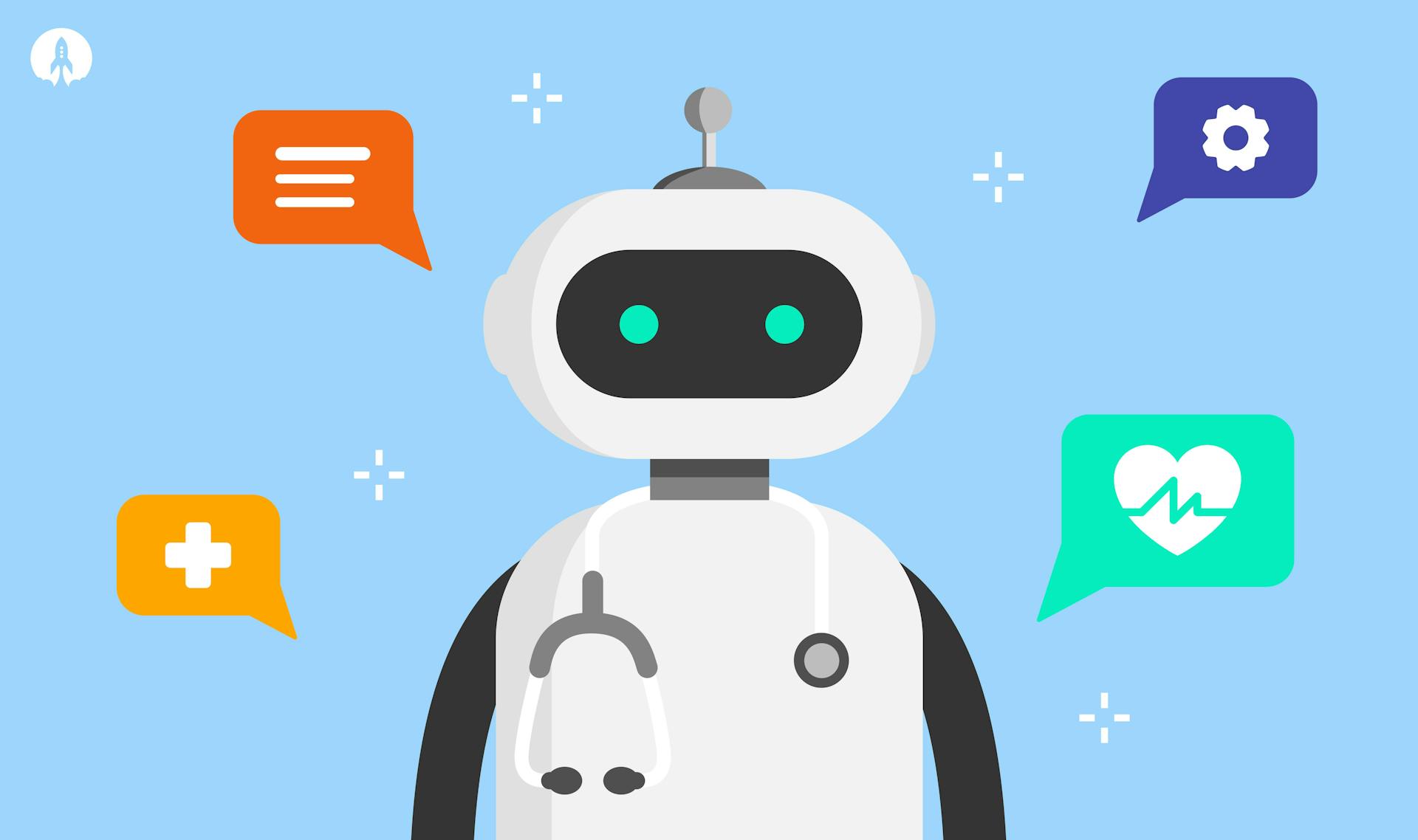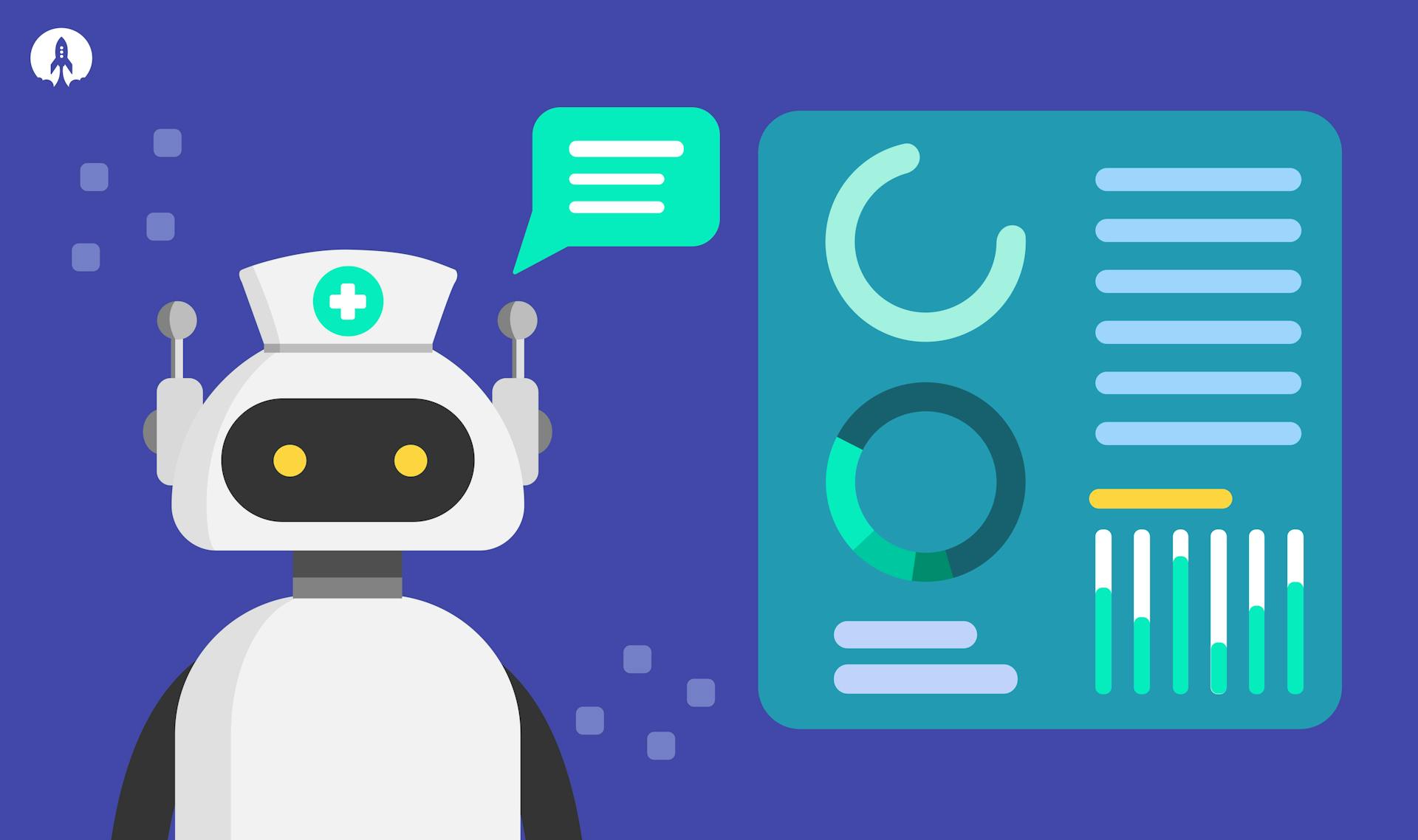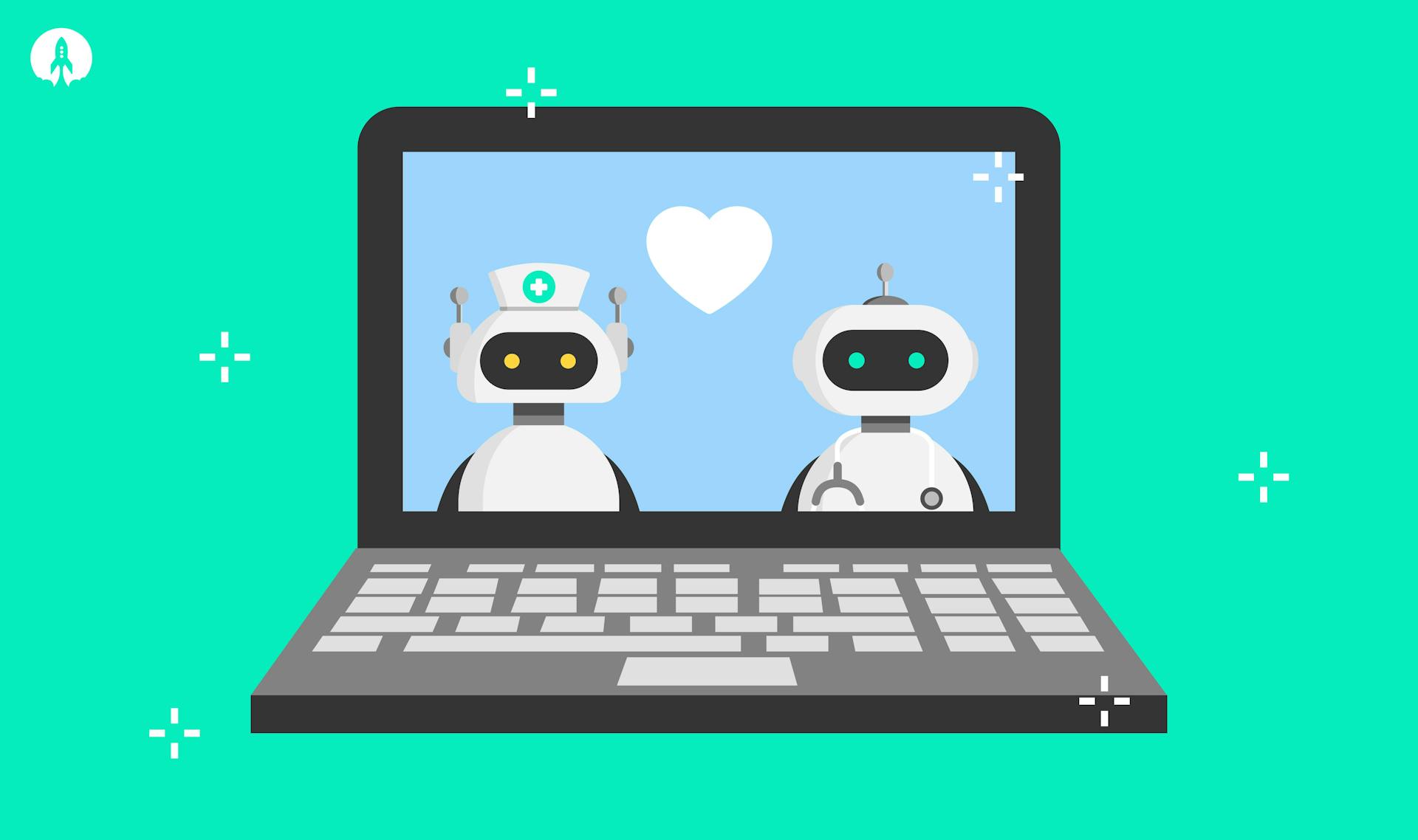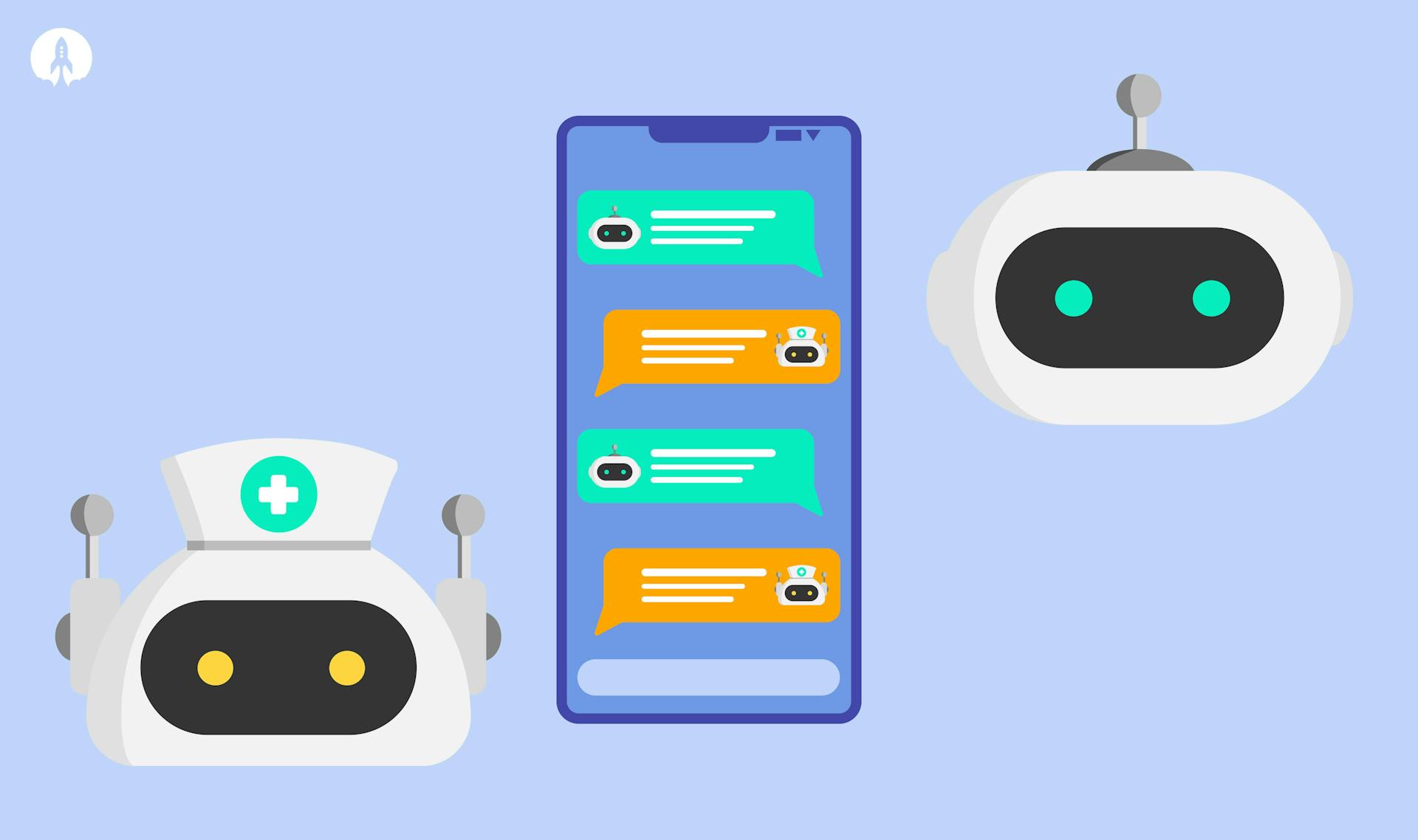Revolutionising Health And Well-Being: The Pivotal Role Of AI In Healthcare Technology

In a future not far from now, imagine a world where a virtual assistant instantly evaluates your symptoms when you feel under the weather. In this world, doctors, backed by data-driven insights, diagnose you in minutes and prescribe treatments tailored uniquely to your genetic makeup.
From urban centres to the remotest villages, quality healthcare can become universally accessible. A world like this isn't a sci-fi dream; it is a possible reality in the domains of health and wellness, all thanks to unprecedented advancements in artificial intelligence.
In this article, we'll explore the role of AI in health and wellness, covering its main applications, benefits, and potential downsides. We'll also discuss the potential for enterprises, scale-ups and startups looking to innovate in this space.
First, What Is Artificial Intelligence?
Artificial Intelligence, commonly known as AI, is the simulation of human intelligence in machines.
In simpler terms, it's about making machines think and act like humans. This is achieved through algorithms, neural networks, and vast datasets.
AI enables machines to learn from experience, adjust to new inputs, and execute tasks that typically require human intelligence, such as visual perception, speech recognition, and decision-making.
ℹ️ Want to learn more about AI and how to use it in your business? Download our AI Guidebook here.
AI in Health and Wellness Technology
When discussing AI in health and wellness, we're talking about integrating this smart technology into medical and health-related tools and practices.

A primary aim of AI in this space is to analyse relationships between clinical data and patient outcomes. Machine learning programs are applied to diagnostics, drug development, personalised medicine, and patient monitoring and care.
AI technology stands apart from conventional healthcare tools because it can collect, process, and interpret vast and varied datasets and produce a well-defined output for the end-user. This is achieved through machine learning algorithms and deep learning.
Key Applications of AI in Health & Wellness
Artificial intelligence (AI) is making significant strides in healthcare and wellness technology, offering numerous applications that enhance patient care, streamline medical processes, and contribute to innovative medical research.
Here's a comprehensive list of potential AI applications in these sectors:
🩺 Disease Identification and Diagnosis
Medical imaging: Detecting abnormalities in X-rays, MRIs, CT scans, etc. by using deep learning algorithms. An excellent example of this is a Swedish study that showed that deep learning AI technology could accurately detect 20% more breast cancers compared to human radiographers.
Predictive analytics: Disease outbreaks or patient deterioration can be forecasted based on analysis of health data trends.

Predictive analytics is one of the most promising aspects of using AI in the health and wellness space.
Unlike traditional healthcare tools, AI excels in gathering and analysing large datasets to provide actionable insights.
AI technology empowers medical professionals to take proactive measures, whether to anticipate disease outbreaks or pinpoint at-risk individuals. These proactive measures can not only optimise resources, but also significantly improve patient outcomes.
Pathology: Identifying diseases by analysing samples. AI-assisted pathology tools have been developed to diagnose breast cancer, hepatitis B, gastric cancer, and colorectal cancer. These AI tools are ideal to help reduce pathologists' workload and get samples processed faster. The knock-on effect is that patients receive their results more promptly.
🩺 Treatment Recommendations
Medicine is moving away from a one-size-fits-all approach, and AI can help medical professionals tailor treatments to individuals to create personalised treatment plans.
Precision medicine refers to the development of therapeutic strategies based on an individual's genetic makeup and health data.
AI can contribute in several ways:
Genomic data analysis: AI algorithms can analyse a person's genome to pinpoint variations linked to disease susceptibilities or drug responses.
Integration with electronic health records (EHRs): AI can process EHRs that contain genetic and other health-related data to deliver holistic patient profiles that consider genetic predispositions and past medical histories.
Predictive modelling: Based on comprehensive data processing, AI models can predict how a patient might respond to a particular treatment or medication, which reduces the trial-and-error approach often seen in treatments.
The benefit is that treatments are more likely to succeed, and treatment plans can avoid potential adverse medication reactions.
💡Insight: Artificial intelligence can also speed up drug discovery
AI offers transformative potential in drug discovery by speeding up the identification of drug candidates through rapid data analysis.
AI technologies can predict compound interactions with biological systems, which leads to more effective treatments with fewer side effects. By repurposing existing drugs for new applications, AI reduces drug development costs.
Moreover, by analysing vast datasets, AI can identify disease biomarkers and design new molecules, which will accelerate drug development and decrease patients' waiting times to receive treatment.
🩺 Health Monitoring and Management
Wearable Devices
Wearable devices such as smartwatches, fitness bands, and specialised medical wearables, contain integrated sensors that continuously collect health data.
Artificial intelligence can be integrated into these devices and improve care in the following ways:
Vital statistics monitoring: These devices can track heart rate, blood pressure, oxygen saturation, and sleep patterns. This constant monitoring allows for a more comprehensive understanding of one's health status.
Alert mechanisms: Advanced algorithms analyse the collected data in real-time, and if any readings fall outside the normal range or exhibit concerning patterns, the device can alert the user. In more advanced settings, these anomalies can be automatically communicated to healthcare professionals for timely intervention.
Chronic Disease Management
Managing chronic diseases requires continuous monitoring, medication adherence, and lifestyle modifications. AI-driven applications play a significant role in streamlining this management process for healthcare workers.
Data analysis: By syncing with wearable devices, these AI systems can access and analyse health data to provide insights specific to a condition, such as blood glucose levels for people with diabetes.
Real-time feedback: Based on the data, the app might suggest adjustments in insulin doses for a diabetic patient or notify them if their heart rate is irregular. Such instant feedback can prevent complications and hospital visits.
Trend analysis: Over time, these applications can identify patterns and trends in the data and offer suggestions for long-term disease management strategies.
🩺 Virtual Health Assistance and Telemedicine
Health Chatbots
Health chatbots are AI-powered platforms designed to interact with users in real time, often through text or voice. These chatbots can rapidly access vast medical databases, making them practical tools for providing immediate information.
Also, patients are supportive of interventions like these. One study found that 64% of patients are comfortable using AI for around-the-clock access to answers that AI virtual nurse assistants provide.
Before a human sees a patient, a health chatbot can:
Provide medical information: Users can ask chatbots about various medical topics, from understanding symptoms to clarifying medication doubts. The chatbots retrieve relevant, evidence-based information tailored to the user's query.
Check symptoms: Chatbots can help users narrow down potential causes for their symptoms by asking structured questions. While they aren't a substitute for professional medical diagnoses, they can guide users on whether to seek medical attention.
Virtual Consultations
Virtual consultations involve real-time interactions between patients and healthcare professionals via telemedicine digital platforms.
While these systems aren't new, they were incredibly valuable during the COVID-19 pandemic and are now a widely used tool for doctors. AI can be incorporated to improve the quality and efficiency of these consultations in the following ways:
Diagnostic assistance: AI-driven systems can assist doctors by analysing patient-provided data – such as images of skin conditions – and suggest potential diagnoses.
Medical record analysis: AI can quickly parse a patient's electronic health records and then highlight relevant information and patterns for the doctor to consider during the consultation.
Treatment recommendations: By cross-referencing the patient's data with medical databases, AI can suggest treatment options or medication dosages, which will aid doctors in their decision-making process.
Mental Health Apps
Mental health apps offer resources, activities, and support for patients with mental health challenges. AI can be used to make these apps more personalised to the user, which improves outcomes.
Behavioural analysis: By analysing user inputs, interactions, and even speech patterns, AI can gauge a user's emotional state and offer real-time interventions or feedback.
Customised support: AI-driven insights can personalise the support offered, from suggesting mindfulness exercises to recommending journaling prompts tailored to the user's emotional state.
Risk assessment: These apps could identify when a user is at risk for severe emotional distress or harmful actions. These apps can guide users to seek professional help, offer crisis helpline numbers, or even alert nominated human experts.
🩺 Medical Records Management
Data Entry Automation
AI can make data entry more efficient and reduce errors in healthcare organisations.
Another exciting way in which AI could enhance data entry is by predicting auto-fill fields based on the initial data entered.
For instance, if a patient's previous records indicate diabetes, the system might auto-populate related fields like medication or the most recently recorded blood sugar level.
Automated systems can cross-reference new data with existing records and flag inconsistencies or potential errors. This not only ensures data integrity, but can also prevent medical mistakes and oversights.
Electronic Medical Records Analysis
One of the biggest challenges that healthcare providers face is accessing and interpreting medical records.
Electronic health records (EHRs) contain massive volumes of patient data. AI can be used to process this data to extract meaningful insights that aid clinical decision-making and diagnosis.
AI can help doctors make better decisions by:
Organising data: AI can automatically categorise and tag medical data, which makes the retrieval of specific information easier for healthcare providers.
Identify patterns: AI can identify trends by analysing a patient's historical data. For example, it could look at a patient's blood pressure over time and detect a gradual increase over months, which would prompt a doctor to prescribe medication or a higher dose.
Suggested interventions: Based on identified patterns, the system can suggest preventive measures, like lifestyle changes, or recommend medical tests.
Anomaly detection: AI can flag anomalies in EHRs, such as sudden spikes in vital signs or conflicting medications, and alert healthcare providers to potential issues.
Natural Language Processing (NLP) for Medical Records
Another aspect of AI that will help manage health records is Natural Language Processing or NLP.
At its core, NLP is about making machines understand and respond to human language. When applied to healthcare, this capability has a lot of benefits.
Streamlining documentation: Traditionally, doctors and their staff have spent significant time manually transcribing patient notes. NLP-powered speech recognition software now allows them to vocalise notes, which are instantly transcribed and provide detailed documentation of a patient's condition.
Structuring doctor's notes: Clinical notes are typically filled with jargon and shorthand, and extracting critical insights from them can be time-consuming. NLP could streamline this process by analysing unstructured data to capture essential details. When integrated into EHRs, this ensures that healthcare providers enjoy access to detailed, current patient information.
Enhancing clinical decision support: As NLP has the capability to process clinical notes, it can assist healthcare providers in that clinicians can make informed decisions by NLP highlighting relevant patient history and flagging potential risks.
🩺 Healthcare Administration and Workflow
One of the most expensive aspects of the healthcare industry is administration. And yes, you guessed it. AI can help here, too!
As the demands on healthcare systems grow, AI's ability to automate tasks, analyse vast datasets, and predict trends is revolutionising how healthcare facilities operate.
This transformation ensures optimal resource utilisation and paves the way for more personalised and effective patient care. Below, we discuss a few ways that AI can help make the job of hospital administrators easier.
Hospital Management
Efficient hospital management ensures that resources are optimised, patients receive timely care, and operational costs are minimised.
Predictive algorithms: These rely on historical data and real-time inputs to forecast hospital needs, from bed availability to staffing requirements.
Optimised resource allocation: AI can analyse patterns to determine the most effective allocation of resources like ICU beds, medical equipment, or even shift schedules for healthcare professionals.
Patient management: Predictive tools can also forecast patient inflow, which helps manage patient admissions, discharges, and transfers seamlessly.
Billing and Claims
Billing and claims processing are crucial administrative tasks in healthcare that can benefit from automation.
Streamlined billing: AI can automate the generation of bills based on services provided, which ensures accuracy and reduces the administrative burden.
Appointment scheduling: AI-driven systems can match patients’ availability with doctors’ schedules, thereby optimising appointment bookings and minimising conflicts.
Claims processing: AI can review, validate, and process insurance claims, flag discrepancies, and ensure timely settlements.

Opportunities in AI for Health and Wellness: Scale-Ups, Startups and Enterprises
What is clear is there is a tremendous potential for AI in healthcare. Both enterprises, scale-ups and startups can potentially drive significant advancements in AI for health and wellness.
Here are a few ways software solutions can make an impact in this space:
🚀Niche AI solutions: There is a lot of potential value in focusing on specific healthcare challenges or niches. This could include rare diseases, specific patient demographics, or localised healthcare system needs.
🚀Innovative wearables: While the market has dominant players, there's always room for wearables and associated software with unique features, better accuracy, or those that address specific health conditions.
🚀Telemedicine platforms: With the rise of remote healthcare, businesses can develop AI-powered telehealth platforms tailored to specialities like mental health, physiotherapy, or dermatology.
🚀Data science: Providing tools to assist medical providers in deriving insights from their healthcare data can be incredibly valuable.
🚀Virtual therapists: AI-driven health platforms can support individuals who might not have easy access to human therapists, such as mental health professionals.
🚀AI-driven health and fitness apps: From nutrition trackers to personalised workout guides, there's a growing market for health apps integrated with AI.
🚀Collaborations and partnerships: Businesses can collaborate with research institutions, hospitals, or NGOs to develop, test, and refine AI solutions.

Benefits of Integrating Artificial Intelligence in Healthcare
🏅Improved Accuracy and Efficiency
Arguably, the biggest benefit of AI in healthcare is improved accuracy and efficiency. Automating tasks reduces the scope for human error - something that is often seen in data entry - or comes to the rescue where humans fail with pattern recognition.
Also, AI can analyse data at speeds incomprehensible to humans. This ability to rapidly process and interpret medical data such as medical images or patient records, means faster and more precise disease diagnoses.
If patients can be seen and diagnosed faster, there can be huge strides in healthcare delivery across the board.
According to Harvard’s School of Public Health, although it’s early days for the use of AI in making diagnoses, it may reduce treatment costs by up to 50% and improve health outcomes by 40%.
🏅Personalisation of Care
Health systems are increasingly focused on individual patients, and AI is speeding up this change. What we mean hereby is that the insights from machine learning models have the potential to help a healthcare provider create treatments and wellness plans tailored to individual needs.
Whether customising drug combinations or offering personalised fitness and diet plans, AI ensures that care is specific to individual needs, preferences, and genetic makeup.
This degree of personalisation not only improves treatment efficacy, but also significantly improves patient satisfaction, which makes them feel truly seen and individually catered to.
🏅Scalability and Outreach
With AI-powered tools, healthcare providers can now easily reach people in distant and often neglected areas.
Through mobile health applications, online doctor consultations, and chatbots for initial diagnostics, even those in remote locations can access vital healthcare services they might otherwise not have been able to due to distance or other challenges.
In essence, AI helps close the gap, ensuring everyone, no matter where they are, has a chance of benefiting from quality healthcare.
🏅Cost Reduction
While introducing AI into healthcare may seem costly initially, the future savings are significant.
AI helps make hospital operations smoother and uses resources more wisely, whether scheduling patient visits or organising hospital supplies.
Plus, AI can spot early health warning signs and advise on steps to prevent them from worsening. We can avoid more serious, costly treatments by catching these issues early.
So, with AI in healthcare, people stay healthier, and costs are kept in check.

The Drawbacks of AI in Healthcare and Wellness
AI holds immense promise for revolutionising healthcare and wellness. However, its integration comes with a specific set of complexities. Below, we'll discuss the main challenges of using AI in healthcare and wellness.
Data Privacy Concerns
As healthcare systems begin to adopt more AI-based platforms, the safety and security of patient data become even more critical.
The online nature of these platforms raises concerns about data breaches or misuse, especially if unauthorised individuals access the information. It's crucial to strictly adhere to data protection principles such as those laid out in the Data Protection Act to protect patient data, as well as legislation that guides best practices in the healthcare industry.
Even though these rules are designed to keep patient information safe, staying compliant with them becomes difficult with rapid technological advances.
Potential for Bias
AI models can unintentionally perpetuate or amplify biases present in their training data. Ensuring fairness and avoiding discrimination in AI-driven medical decisions is of paramount ethical importance.
Ethical AI requires ongoing audits to ensure that the algorithms do not inadvertently disadvantage any particular group of patients.
Technical Limitations
Artificial intelligence in healthcare is only as good as the data it's trained on. In many parts of the world, access to comprehensive and clean health data needs to be improved, as the lack thereof limits the effectiveness of AI tools.
There's also the risk of overfitting, where an AI model might perform exceptionally well on its training data but poorly in real-world scenarios.
Lack of Transparency
Many advanced AI models, especially deep learning, are considered "black boxes", which means that their decision-making processes are not entirely transparent or understandable.
Stakeholders, especially patients, have the right to know how decisions affect their care.
A lack of AI transparency can also be problematic in medical scenarios where healthcare workers must understand the reasoning behind decisions.
Other challenges include:
⚠️Liability issues: In cases where AI-driven devices or recommendations result in patient harm, determining responsibility can be complex. Is it the device manufacturer, the software developer, or the medical practitioner who is at fault?
⚠️Depersonalisation of care: Relying heavily on algorithms might risk losing the personal touch in healthcare, which is integral to patient trust and holistic treatment.
⚠️Integration challenges: Integrating AI solutions into existing healthcare systems can be technically challenging and costly. It also requires training staff to use new tools effectively.
⚠️Job losses: There's concern that AI might replace certain healthcare jobs, especially those related to data entry or basic diagnostic services.
⚠️Ethical considerations: Who gets to decide which AI models to prioritise? For instance, if an AI platform is used to allocate available resources, on which grounds would it determine who gets priority treatment?
⚠️Economic implications: The development and implementation of AI in healthcare can be expensive, particularly in the early adoption stages. This could increase healthcare costs or make certain treatments inaccessible to population segments.
Final Thoughts
The integration of AI into the healthcare and wellness industry is nothing short of revolutionary.
AI's ability to rapidly analyse vast amounts of data, make predictions, and offer actionable insights has the potential to drastically improve patient outcomes, reduce costs, and democratise access to healthcare services.
However promising and exciting the future impact of AI on healthcare seems, it has its challenges. Data privacy, potential biases, and ethical considerations need rigorous scrutiny.
Additionally, as we move towards a more automated healthcare system, it's paramount to ensure that the human touch, so vital in healing, remain preserved.
For scale-ups, startups, enterprises, and healthcare professionals, the message is clear: AI's integration into healthcare is not just a fleeting trend, but a future reality.
However, this journey must be embarked upon cautiously and it must ensure that advancements put patient well-being at the centre.
🚀 Rocketmakers: Experts in Health & Wellness AI Solutions
Looking to revolutionise healthcare with AI-driven software? Dive in with Rocketmakers! As a proud B Corp, we're not just experts in AI; we're committed to crafting software that enhances people's health and wellness.
From personalised health apps to advanced diagnostic tools, our team transforms your ideas into impactful digital solutions.
🔗Connect with us, and let's innovate healthcare together, one line of code at a time!



